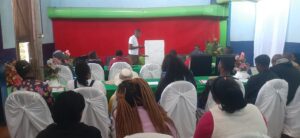Sofia Mapuranga
Harare—There is need to equip grassroots and marginalised communities with skills and knowledge to fight all forms of disinformation and misinformation, according to Tawanda Majoni, an advocate of sustainable socio-economic development.
Majoni made the observation following a recent two-day training workshop in the border city of Mutare that targeted community-based organisations (CBOs) operating in Manicaland province.

Group presentation during the training workshop
He is coordinating the community project as an awardee of the International Visitor Leadership Programme (IVLP) that is run in the Office of International Visitors under the US Department of State’s Bureau of Educational and Cultural Affairs.
The project will see selected communities setting up social media platforms, using physical gatherings and engaging the mainstream media in the fight against disinformation and misinformation.
Majoni, who is also the founder and director of Information for Development Trust (IDT) that promotes public accountability through investigative journalism, advocacy and research, led the training of representatives and leaders of six CBOs that focus on different though sometimes overlapping development programmes.
These include mining and environmental rights, youth and women empowerment, economic development, human rights, urban as well as rural service delivery and public accountability.
“Grassroots and marginalised communities are particularly vulnerable to disinformation, misinformation and mal-information. We have observed that while the spread of information is a global problem affecting both advanced and developing economies, grassroots communities have peculiar fragilities.
“These fragilities require customised interventions to develop the communities’ resilience to disinformation and misinformation. One such intervention is to train the communities in a sustainable way and ensure that they develop and carry forward appropriate strategies,” Majoni told NewsHub.
He said the training that took place over a week ago in the eastern city of Mutare would be followed up with a second workshop.
At the first workshop, trainees numbering 24 were trained on the nature of disinformation and disinformation, how to detect the two, fact-checking information as well as devising and implementing strategies to combat fakery through offline and online methods.
“One key highlight of the training that is taking place is the emphasis on offline disinformation and misinformation. Conversations around the two tends to focus predominantly on online fakery, especially through social media.
“However, the truth is that fake information spreads through online or digital platforms more or less the same way as offline methods that include political rallies, oral tradition, social gatherings, commemorations and other in-person meetings as well as adverts and press statements, among others,” said Majoni.
The trainees were unanimous that disinformation and misinformation were affecting them negatively.
“We are fed with loads of fake information on a daily basis and have limited capacity to distinguish between what is true and false. Most of the time, we have to wait for some social media actors that correct the false information but, in the majority of the cases, we just take the information as accurate.
“This is why the training we are undergoing is important. We have already acquired valuable knowledge on how to detect and expose false information,” said Cosmas Sunguro, the leader of a participating CBO, Zimbabwe Diamond Workers’ Union (ZIDAWU).

Manicaland is home to rich deposits of diamonds.
According to Sunguro, foreign-owned and local diamond miners were exploiting the rural host communities.
“They claim that they have brought development and employment to the local communities, but this is clear disinformation. There are so many lies by the mining companies that need to be exposed so that the world knows.
“The training that we went through has already enriched our understanding of disinformation, so we will be teaching the communities that we serve and ensure that we actively identify and publicise the fake information and its sources,” said Sunguro.
Coit Sandirai from the Mutasa Youth Forum that mainly serves a rural constituency outlined several strategies that her organisation would use to fight disinformation and misinformation, among them forming a steering committee or club that would educate the community and lead in identifying fake information.

“I actually didn’t know there is a difference between disinformation and misinformation. I now know how to distinguish between fake and true news and, as someone working with rural women, I will be able to engage my community so that we can collectively identify false information and ensure that the world knows what lies are being spread and by who,” Sandirai said.
Fungai Nhaitai, the director of Youth Empowerment Trust of Zimbabwe (YETZ) told NewsHub that even before the training is through, he had already identified a focal person from his organisation who would lead the CBO’s campaign against disinformation.
“We are definitely going to implement several strategies that we have learnt about and I have already selected an officer who will lead the campaign,” said Nhaitai.

The other CBOs which were part of the training are: Manica Youth Assembly (MAYA) that is based in urban Mutare, Zivanai Community Empowerment Trust (ZICET) focusing on gold-rich Penhalonga and the Social and Economic Justice Ambassador (SEJA), which is also operating in the city.
*Funding for the project is provided by the US Department of State’s Bureau of Educational and Cultural Affairs with Meridian International Centre as the implementing partner.


Comments are closed.